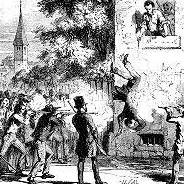Treason laws in the United States
[3] Definition: In Article III, Section 3 of the United States Constitution, treason is specifically limited to levying war against the U.S., or adhering to their enemies, giving them aid and comfort.
Levying war means the assembly of armed people to overthrow the government or to resist its laws.
[6] Treason does not distinguish between participants and accessories; all persons who rebel or intentionally give aid to hostilities are subject to the same charge.
[7] Death sentences for treason under the Constitution have been carried out in only two instances: the executions of Taos Revolt insurgents in 1847, and that of William Bruce Mumford during the Civil War.
[9] The last federal treason conviction to be fully upheld was that of Nazi sympathizer Herbert John Burgman in 1949.
Also similarly, conviction requires the testimony of two witnesses to the same overt act, or confession in open court.
Augustine Spencer swore out a warrant alleging that the Smith brothers had committed treason by "calling out the Legion to resist the force under the command of the Governor".
Joseph Smith and five others were charged with treason under Missouri law in 1838, spending over five months in prison, but escaped while awaiting trial.
[34] During the War of 1812, Mark Lynch, Aspinwall Cornell, and John Hagerman sold supplies to British ships.
Thomas Wilson Dorr was convicted of treason against Rhode Island in 1844 for leading a rebellion against the state government, and sentenced to life imprisonment.
In January 1854 the legislature passed an act annulling the verdict of the Rhode Island Supreme Court.
John Brown was charged with treason against the Commonwealth of Virginia, along with conspiracy and first-degree murders after he led his raid on Harper's Ferry in 1859.
[55] The Indian Civil Rights Act limits sentences for crimes by tribal courts to no more than one year in jail and a $5,000 fine.
[57][58] In the United States, Benedict Arnold's name is considered synonymous with treason due to his collaboration with the British during the American Revolutionary War.
In 1807, on a charge of treason, Burr was brought to trial before the United States Circuit Court at Richmond, Virginia.
The only physical evidence presented to the grand jury was General James Wilkinson's so-called letter from Burr, which proposed the idea of stealing land in the Louisiana Purchase.
The trial was presided over by Chief Justice of the United States John Marshall, acting as a circuit judge.
Since no witnesses testified, Burr was acquitted in spite of the full force of Jefferson's political influence thrown against him.
[59] During the American Civil War, treason trials were held in Indianapolis against Copperheads for conspiring with the Confederacy against the United States.
[60][61] In addition to treason trials, the federal government passed new laws that allowed prosecutors to try people for the charge of disloyalty.
[63] In addition to the Conspiracies Act of July 31, 1861, in 1862, the federal government went further to redefine treason in the context of the civil war.
[64] When accepting Lee's surrender of the Army of Northern Virginia, at Appomattox Courthouse, in April 1865, Gen. Ulysses S. Grant assured all Confederate soldiers and officers a blanket amnesty, provided they returned to their homes and refrained from any further acts of hostility, and subsequently other Union generals issued similar terms of amnesty when accepting Confederate surrenders.
[65] All Confederate officials received a blanket amnesty issued by President Andrew Johnson on Christmas Day, 1868.
On July 26, 1943, Robert Henry Best, Douglas Chandler, Fred W. Kaltenbach, Edward Leo Delaney, Constance Drexel, Jane Anderson, Max Otto Koischwitz, and Ezra Pound had been indicted in absentia by a grand jury in Washington, D.C. on charges of treason.
The rest either had the charges dropped due to a lack of evidence or dismissed due to other circumstances (Koischwitz died in a Berlin hospital in 1944, Kaltenbach reported died while in Soviet custody, and Pound (accused of being involved in Nazi and Italian Fascist propaganda) was found unfit to stand trial.
Mildred Gillars, a German-American, along with Rita Zucca was nicknamed "Axis Sally" for broadcasting Axis propaganda (Zucca, an Italian-American, had renounced her US citizenship and it was decided not to indict her for treason, but in 1946 she was convicted by an Italian military tribunal on charges of collaboration and was released nine months later after the Italian government declared a general amnesty for collaborators).
In 1952, Tomoya Kawakita, a Japanese-American dual citizen was convicted of treason and sentenced to death for having worked as an interpreter at a Japanese POW camp and having mistreated American prisoners.
The most memorable of these came from Senator Joseph McCarthy, who used rhetoric about the Democrats as guilty of "twenty years of treason".
The Cold War period saw no prosecutions for explicit treason, but there were convictions and even executions for conspiracy to commit espionage on behalf of the Soviet Union, such as in the Julius and Ethel Rosenberg case.
On October 11, 2006, the United States government charged Adam Yahiye Gadahn for videos in which he appeared as a spokesman for al-Qaeda and threatened attacks on American soil.

